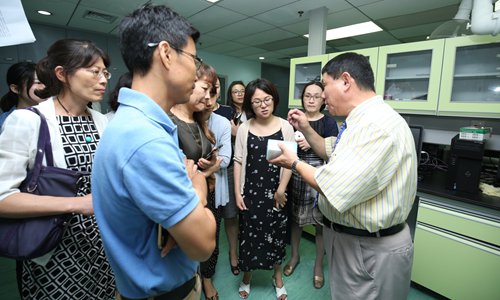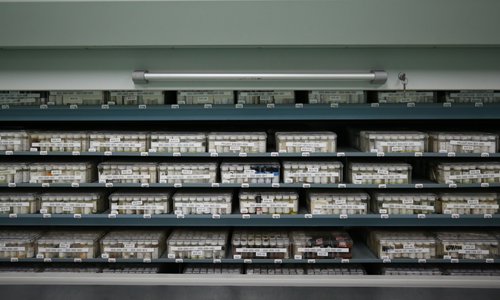
Wang Mingwei (right) speaks to journalists during the tour. (Photo: Courtesy of Novo Nordisk)
The Chinese National Compound Library invited media and other guests to tour its facility inside the Zhangjiang Hi-Tech Park in Shanghai on June 28, 2017.
Representatives from many local health and pharmaceutical media and other major media houses participated in the tour.
Wang Mingwei, the director of the library, acted as the tour guide for the day. Wang is also a researcher at the Shanghai Institute of Materia Medica of the Chinese Academy of Sciences and the dean of the School of Pharmacy at Fudan University.
The Chinese National Compound Library specializes in science and engineering compounds as well as research and application in the pharmaceutical industry. The Shanghai municipal government has invested over 200 million yuan ($29.48 million) in it.
About two million compounds are stored in the more than 6,300-square-meter four-story building which serves as the library. The facility is also equipped with advanced laboratory equipment.
During his introduction of the history of the library, Wang specially thanked Novo Nordisk, a Danish pharmaceutical company with more than 90 years of innovation and leadership in diabetes care, for its commitment to the development of the library and its resources over the last 10 years.

Some of the compounds stored in the library (Photo: Courtesy of Novo Nordisk )
"In 2007, Novo Nordisk donated about 500,000 compounds to the Shanghai Institute of Materia Medica of the Chinese Academy of Sciences and the National Center for Drug Screening to establish China's national compound library," Wang said. "Novo Nordisk's donation is the most valuable public asset China's science and technology industry has received after 1949."
Novo Nordisk is headquartered in Copenhagen in Denmark and has over 42,000 employees in 77 countries and regions, providing products and services to 165 countries and regions around the world. Besides diabetes care, the company also focuses on other serious chronic diseases like hemophilia, growth disorders and obesity.
Zhang Kezhou, the vice president of Novo Nordisk China, stressed the importance of a sustainable and innovative ecosystem for developing new drugs. He said since the pharmaceutical industry is high risk and needs a large investment and a long period to develop, the right policy environment, technical expertise and capital are necessary to create a sustainable, innovative ecosystem for the pharmaceutical industry.
Since 2007, Novo Nordisk has started cooperations with the Chinese Academy of Sciences, the Chinese Academy of Medical Sciences, Shanghai Jiao Tong University's School of Medicine, and the School of Pharmacy at Fudan University to support medical research, education and training in China.
"We are glad to see the great scientific achievements the Chinese National Compound Library has gained so far," Zhang said.
"Novo Nordisk will continue to focus on the development of new drugs and invest in China to support a sustainable, innovative ecosystem for the pharmaceuticals industry."
(Source:Global Times Published: 2017/7/4 19:38:39)